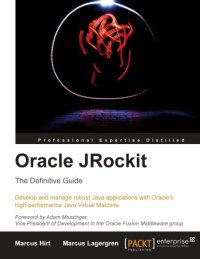
Ebook: Oracle JRockit the definitive guide ; develop and manage robust Java applications with Oracle's high-performance Java Virtual Machine
Author: Hirt Marcus, Lagergren Marcus
- Tags: Application software / Development, Application software--Development, Java (Computer program language), Java virtual machine, Application software -- Development
- Year: 2010
- Publisher: Packt Publishing
- City: Birmingham;Mumbai
- Language: English
- pdf
Turning off optimizationsChanging the number of code generation threads; Directive files; Summary; 3. Adaptive Memory Management; The concept of automatic memory management; Adaptive memory management; Advantages of automatic memory management; Disadvantages of automatic memory management; Fundamental heap management; Allocating and releasing objects; Fragmentation and compaction; Garbage collection algorithms; Reference counting; Tracing techniques; Mark and sweep; Stop and copy; Stopping the world; Conservative versus exact collectors; Livemaps; Generational garbage collection.;Oracle JRockit; Oracle JRockit; Credits; Foreword; About the Authors; Acknowledgement; About the Reviewers; Preface; What this book covers; What you need for this book; Who this book is for; Conventions; Reader feedback; Customer support; Errata; Piracy; Questions; 1. Getting Started; Obtaining the JRockit JVM; Migrating to JRockit; Command-line options; System properties; Standardized options; Non-standard options; VM flags; Changes in behavior; A note on JRockit versioning; Getting help; Summary; 2. Adaptive Code Generation; Platform independence; The Java Virtual Machine; Stack machine.;Develop and manage robust Java applications with Oracle's high-performance JRockit Java Virtual Machine with this book and eBook;Multi generation nurseriesWrite barriers; Throughput versus low latency; Optimizing for throughput; Optimizing for low latency; Garbage collection in JRockit; Old collections; Nursery collections; Permanent generations; Compaction; Speeding it up and making it scale; Thread local allocation; Larger heaps; 32-Bits and the 4-GB Barrier; The 64-bit world; Compressed references; Cache friendliness; Prefetching; Data placement; NUMA; Large pages; Adaptability; Near-real-time garbage collection; Hard and soft real-time; JRockit Real Time; Does the soft real-time approach work?; How does it work?.;Bytecode formatOperations and operands; The constant pool; Code generation strategies; Pure bytecode interpretation; Static compilation; Total JIT compilation; Mixed mode interpretation; Adaptive code generation; Determining "hotness"; Invocation counters; Software-based thread sampling; Hardware-based sampling; Optimizing a changing program; Inside the JIT compiler; Working with bytecode; Bytecode obfuscation; Bytecode "optimizers"; Abstract syntax trees; Where to optimize; The JRockit code pipeline; Why JRockit has no bytecode interpreter; Bootstrapping; Runtime code generation; Trampolines.;Code generation requestsOptimization requests; On-stack replacement; Bookkeeping; Object information for GC; Source code and variable information; Assumptions made about the generated code; A walkthrough of method generation in JRockit; The JRockit IR format; Data flow; Control flow; A word about exceptions; JIT compilation; Generating HIR; MIR; LIR; Register allocation; Native code emission; Generating optimized code; A general overview; How does the optimizer work?; Controlling code generation in JRockit; Command-line flags and directive files; Command-line flags; Logging.
Download the book Oracle JRockit the definitive guide ; develop and manage robust Java applications with Oracle's high-performance Java Virtual Machine for free or read online
Continue reading on any device:

Last viewed books
Related books
{related-news}
Comments (0)